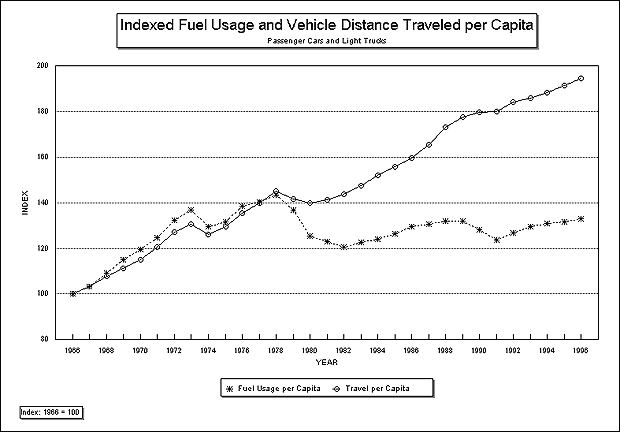dub_scratch wrote:emersonbiggins wrote:
Not only that, but if the US fuel economy for cars indeed has doubled since 1975, this figure conveniently omits the trend of the market towards SUVs and large trucks, which immediately negate the savings in the efficiencies of autos, and perceived efficiencies overall. And let's not forget the upward trend of vehicle-miles-traveled, clearly negating efficiencies as well.
...and here is exhibit 'A'

Here we see that fuel economy improved and the public simply consumed those benefits by driving more. I would argue that the fleet replacement not only permitted more driving, but the rise in VMT helped accelerate the fleet replacement. If VMT were to be flat over that period, less cars would have been sold and the average MPG improvement would have been less.
Exhibit A proves my point: Notice that per capita fuel consumption has gone down suddenly and rapidly with the oil shock of 1978-79. fuel consumption went down far more radically than miles traveled.
Now look at 1980 and 1981: oil prices kept pushing up, fuel consumption kept going down, but miles traveled were already UP again.
After that, fuel consumption kept floating for a decade and a half at more or less the same level, it did not increase (1982-1996), even though oil became much cheaper again.
During the 1990s, with oil at historic lows, fuel consumption did not go up, but miles did spectacularly.
In short, fuel efficiency becomes extremely important in times of crises. In such times, greater efficiency allows people to travel as much as they do normally (holidays included). That's why efficiency increases ALONE are enough to mitigate oil crises. With today's price crisis, we see the same.
And since Peak Oil is essentially a "crisis" discourse, this very graph negates the doomer argument entirely. Prices may go up and up, it won't affect people fundamentally, since MERE increases in efficiency mitigate the crisis.
Thx for proving my point.
The year is 2015:
-John D: Sir, I want to buy a new car. This car, my old one, gets 25mpg. But you know, with Peak Oil and all that and with oil at US$ 200 a barrel, will I even be able to commute to work every day with this new car that you're showing me?
-Salesperson: Ah, don't worry, sir, this flexy car gets you 150 mpg on Bush-diesel, that is 120mpg on the much cheaper Obama-ethanol. Forget Peak Oil and high prices. You'll be able to go to work, enjoy the driving season, and visit your granny in Canada, all the while saving money compared to what your old car gave you back *in 2005*, remember, when oil was so cheap at US$ 75.
-John D: WTF sir, 150mpg? Are you sure, this ain't no sales trick or something? And you sure it works on Obama-ethanol? I have been dreaming of owning a car that works on that ultra-cheap stuff... You ain't joking?
-Salesperson: No sir, of course not, 150mpg is the minimum standard mandated by law. President Clinton introduced it in 2008, remember? The minimum.
The Obama-ethanol is not mandated, but everyone wants it.
Now shall we have a look at the 250mpg car? That's 250mpg on dirty old Bush-diesel, 200mpg on the dirt-cheap Obama-ethanol. They come in at a few thousand dollars more.
-John D [broad grin on his face]: Hell yea sir, those doomers really had me for a second... 200mpg on Obama-ethanol, me likes it. Hell yea sir. I'm buyin.

